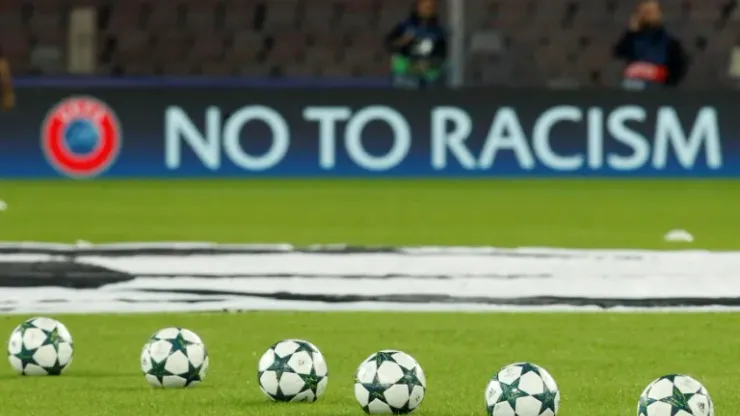
Turin (Italy) (AFP) – These should be the best of times for Italian football.
Juventus reached their second Champions League final in three years on Tuesday evening, new investors are promising a revival of AC Milan and and Serie A is casting off its reputation for sterile defensive fare.
But the renaissance risks being clouded by reminders of football’s dark ages: the spectre of racism has returned to haunt the national sport.
Ten days after Ghana midfielder Sulley Muntari walked off in disgust at being racially abused during a match at Cagliari, the fans responsible have not been identified.
And no action has been taken against the Sardinian club.
Muntari, in contrast, was sanctioned, after failing to persuade the referee to suspend the match.
Remonstrating with the fans earned him a first yellow card, walking off in frustration a while later got him a second and a sending off, leading to an automatic one-match ban.
An outcry spearheaded by the international players’ union and the UN human rights agency saw the ban overturned on appeal.
Muntari has subsequently sought to highlight his treatment in interviews, protesting at “being made to feel like a criminal” while the game’s governing bodies sit on their hands.
The spotlight on Italian football brightened after Juventus’s Moroccan defender Medhi Benatia cut short a TV interview at the weekend after reportedly hearing someone involved in the production describing him in racially derogatory terms.
– ‘Racism never punished’ –
Italian football cannot be blamed for that incident. But sociologist and writer Mauro Valeri believes its racism problem is only partly about sport reflecting the outside world.
“What happened with Muntari is a very important episode. But only because he reacted. Sadly, this kind of thing is all too common,” Valeri told AFP.
“And it is not just Serie A and B. In junior football there have been 80 registered cases of black players being abused in the last two years. Usually by parents of their opponents and almost invariably nothing is done about it.”
The Muntari abuse was one of a string of recent cases of black players being verbally attacked from the stands.
Serie A has sanctions procedures but the criteria for applying them (such as the whole stadium must be able to hear the abuse) means they are hardly ever used.
“It is just ridiculous,” according to Valeri. “The result is racism is never punished.”
Another problem is that although Italy has strong legislation covering racial abuse, the law requires positive identification of the individuals involved, and clubs cannot be held responsible for failing to identify perpetrators.
Valeri says clubs’ fear is alienating their most hardcore fans, even if they have extremist or even criminal affiliations. And broader cultural and political influences also shape attitudes.
– Stadium to streets –
“Within Italian football there is no anti-racism movement and other anti-racism associations don’t take any interest in football,” said Valeri.
This leaves anyone who takes a stand isolated, as happened to the country’s most prominent black player, Mario Balotelli, he argued.
“Balotelli had to endure endless abuse but he never had any kind of support in trying to stop it,” said Valeri, noting how reluctant white Italian footballers are to join anti-racism campaigns.
“In Italy anti-racism is not everyone’s battle. If you say you are against racism, you risk people saying maybe you’re a communist.”
Mainstream Italian politicians are reluctant to take a stand for fear of being seen as not appreciating voters’ worries about the arrival of more than half a million mainly African migrants in three years.
“Today, talking about racism means losing votes,” said Valeri.
Within football, suggesting Italy could learn from neighbouring countries seems to raise hackles.
“I don’t believe it is just an Italian problem, it’s global,” Juventus defender Giorgio Chiellini said ahead of Tuesday’s win over Monaco.
“I just hope that as soon as possible we can stop talking about racism and race and only talk about Chiellini, Benatia, Muntari, what they do on the pitch, were they good or not so good.”
Hoping the problem will go away is not enough, said Valeri.
“Many sociologists talk of the phenomenon of the weekend racist — someone who goes to the stadium and shouts abuse but does not apply the same approach to people he meets during the week.
“Personally I think that is wrong and what is happening in the stadiums now risks being reproduced outside.
“If it is okay to insult black players inside a stadium, it quickly becomes normal to insult a young guy from Gambia or elsewhere that you meet in the street.”
Sebastian Louis, a French expert on fan culture, said the recent incidents should not be downplayed but argues that Italy is changing.
“You have to remember that in 1996, in a Verona derby, a black mannequin was brandished with a noose around its neck by two supporters wearing Ku Klux Klan hoods.
“Throughout the 1980s there were extreme right symbols in numerous stadiums, racist attacks outside them. The situation has evolved.”
200+ Channels With Sports & News
- Starting price: $33/mo. for fubo Latino Package
- Watch Premier League, Liga MX & Copa Libertadores
The New Home of MLS
- Price: $14.99/mo. for MLS Season Pass
- Watch every MLS game including playoffs & Leagues Cup
Many Sports & ESPN Originals
- Price: $10.99/mo. (or get ESPN+, Hulu & Disney+ for $14.99/mo.)
- Features Bundesliga, LaLiga, NWSL, & USL
2,000+ soccer games per year
- Price: $7.99/mo
- Features Champions League, Serie A, Europa League & EFL
175 Premier League Games & PL TV
- Starting price: $7.99/mo. for Peacock Premium
- Watch 175 exclusive EPL games per season